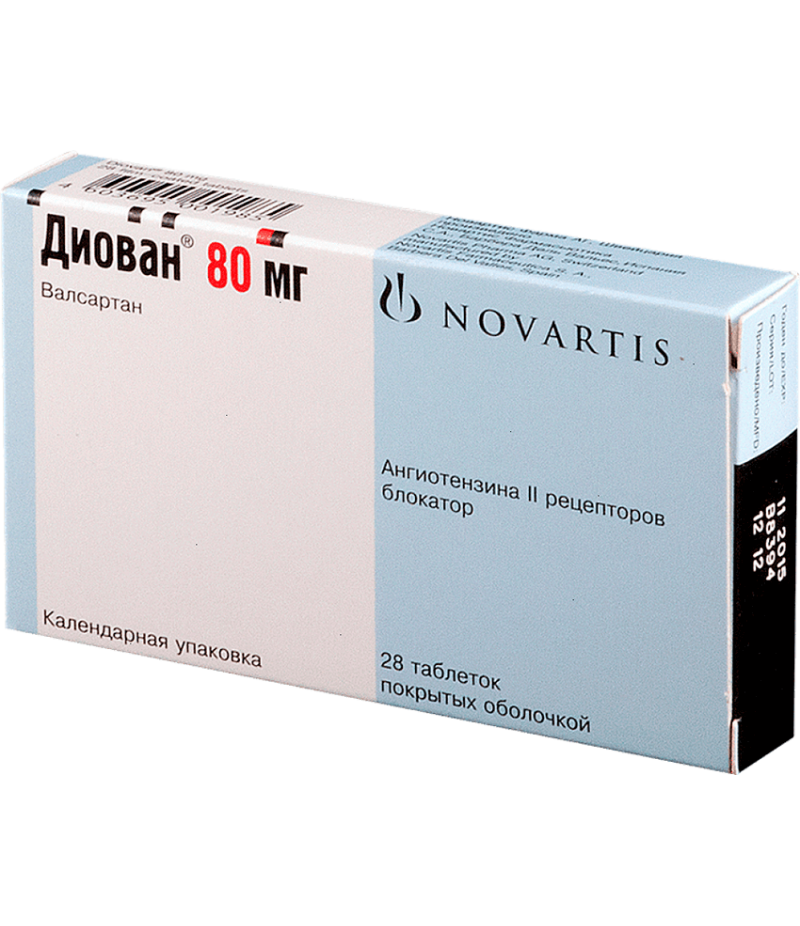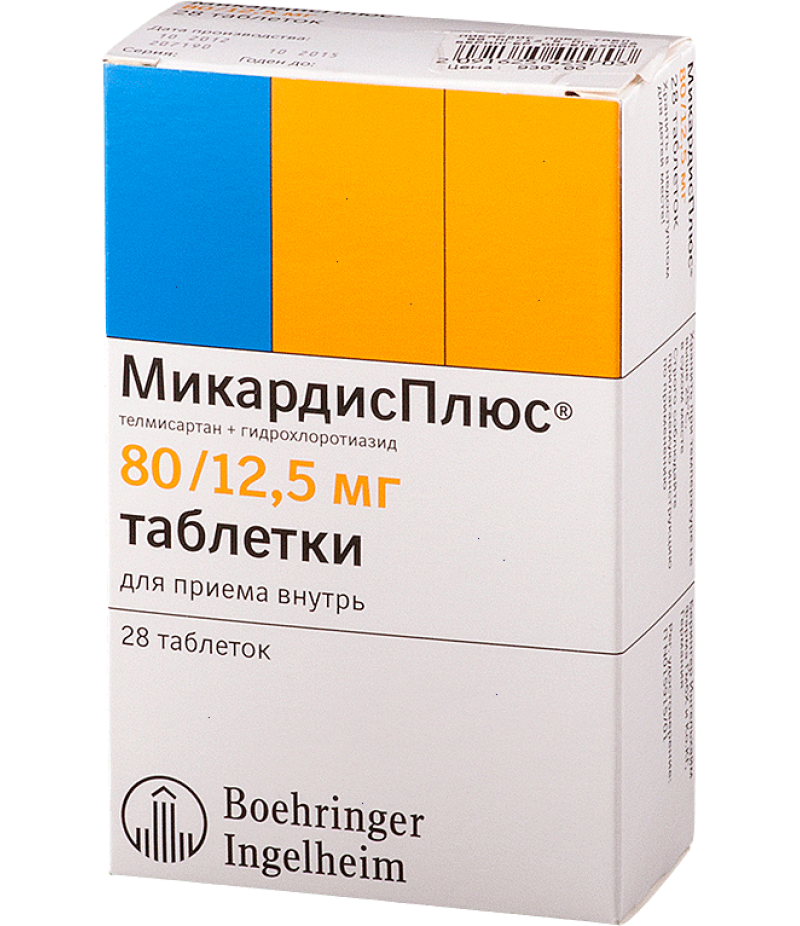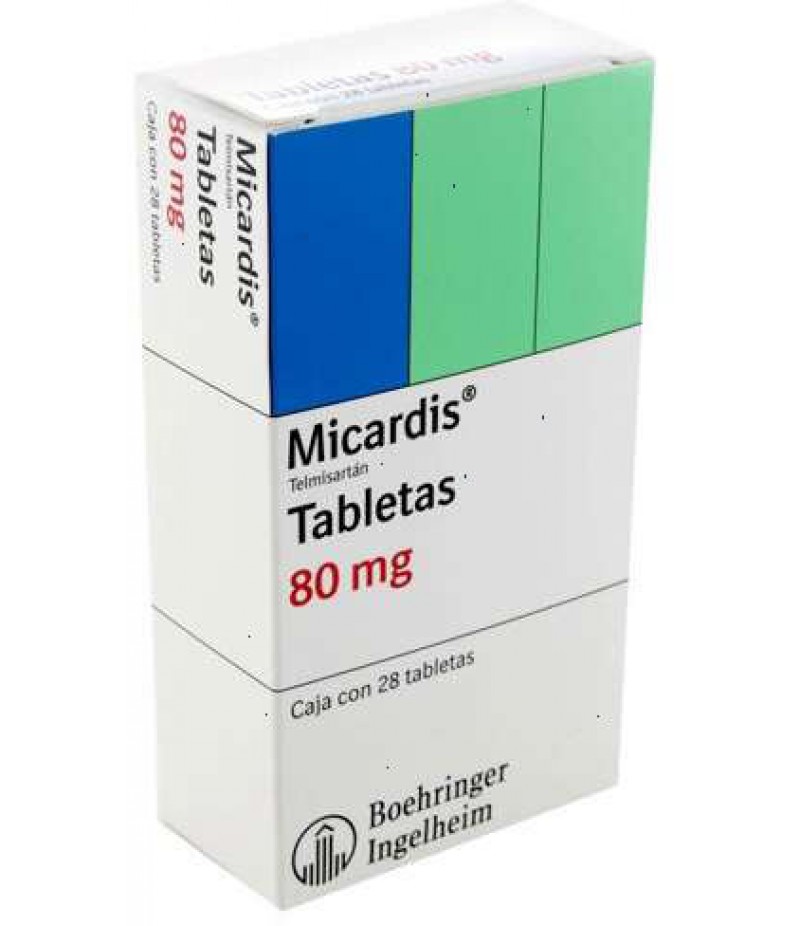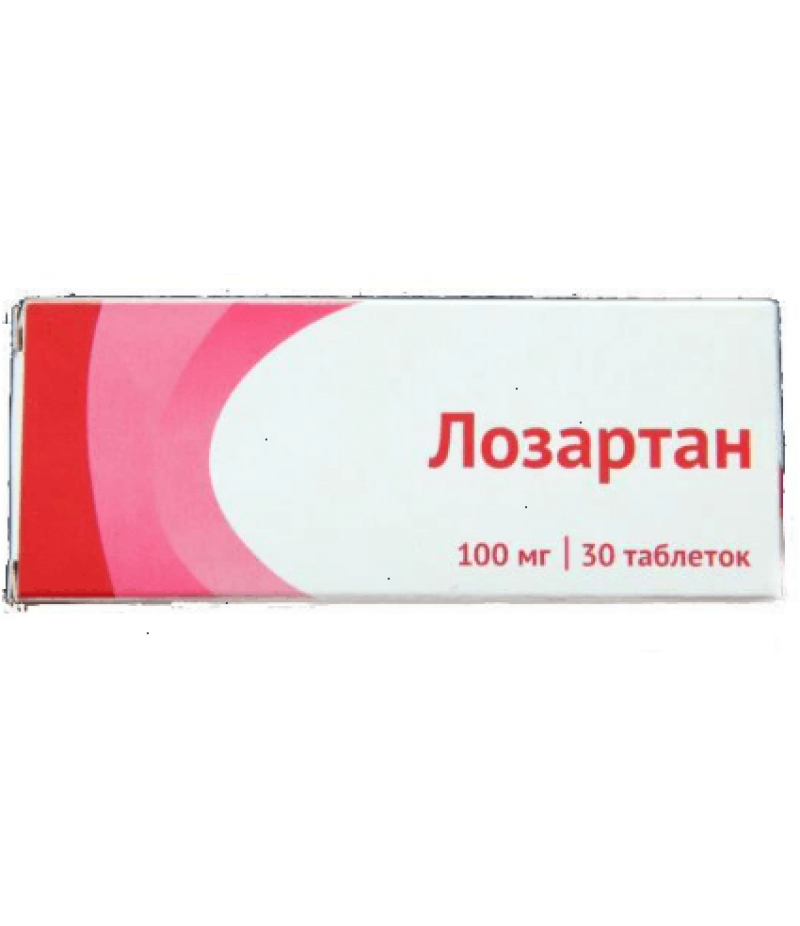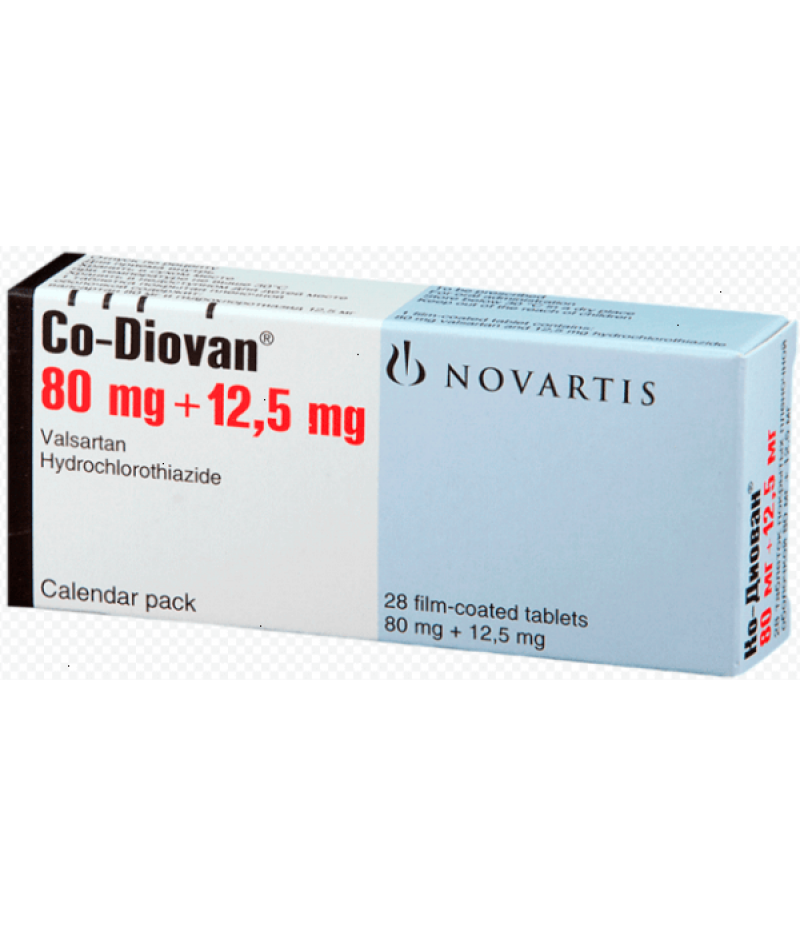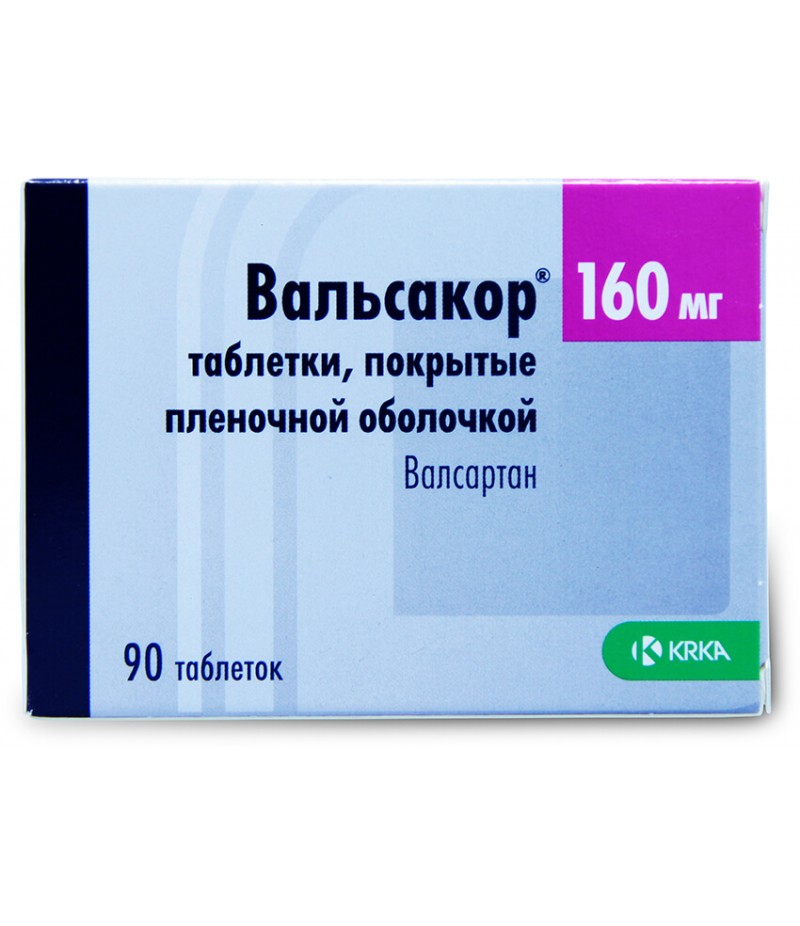Diovan tabs 80mg #28
- $47.88
- 2 or more $46.70
- 3 or more $45.89
- Availability:In Stock
Diovan user manualYou can buy Diovan pills on this pageSee also - Co-DiovanCompositionOne tablet contains 40, 80, 160 or 320 mg of valsartan - the active substance.Additional ingredients: crospovidone, microcrystalline cellulose, ..
Tags: tabs
Diovan user manual
You can buy Diovan pills on this page
See also - Co-Diovan
Composition
One tablet contains 40, 80, 160 or 320 mg of valsartan - the active substance.
Additional ingredients: crospovidone, microcrystalline cellulose, macrogol 8000, silicon dioxide, hypromellose, magnesium stearate, E171, E172.
Form of issue
The drug Diovan is available in the form of tablets in a shell.
One package of the preparation for 40, 80 and 160 mg can contain 14, 28, 56 or 98 tablets.
One package of the drug at 320 mg can contain 14, 28, 56, 98 and 280 tablets.
pharmachologic effect
Hypotensive.
Pharmacodynamics and pharmacokinetics
Diovan (Diovan) is a specific active antagonist of angiotensin II receptors. The active ingredient, valsartan, selectively affects the receptors of the AT1 subtype responsible for the functions of angiotensin II, blocks them, thereby increasing its plasma concentrations, which in turn stimulates the AT2 receptor subtype. The drug does not show any significant agonism with respect to the AT1 receptors, since its affinity for these receptors is much higher than for the AT2 receptors.
Due to the lack of valsartan for angiotensin-converting enzyme (ACE), responsible for degradation of bradykinin, the possibility of cough as a side effect is minimal. Valsartan does not affect ion channels and does not interact with the hormone receptors involved in the regulation of cardiovascular function. When therapy of hypertension lowers blood pressure (arterial pressure), without changing heart rate (heart rate).
With the internal (oral) intake of a single dose of valsartan, the hypotensive effect, in most patients, was observed for 2 hours, reached its maximum after 4-6 hours and persisted for a day or more. With repeated admission, the maximum decrease in blood pressure is usually achieved within 2-4 weeks, regardless of the dose of the drug and is maintained at a high level throughout the duration of treatment. When combining valsartan with hydrochlorothiazide, there is an additional significant decrease in blood pressure. If there is a need for an abrupt cessation of treatment with Diovan, its withdrawal does not lead to a sudden increase in blood pressure or other negative clinical manifestations.
In the treatment of CHF (chronic heart failure), the mechanism of action of valsartan is associated with its ability to eliminate the negative effects of chronic excitation of RAAS (the renin-angiotensin-aldosterone system) and angiotensin II, that is, vasoconstriction. Valsartan also prevents the proliferation of cells, reduces the amount of fluid in the body, normalizes the replication of hormones: endothelin, aldosterone, catecholamines, vasopressin, etc. Diovan reduces preload, decreases diastolic pressure in the pulmonary artery and pulmonary capillary pressure, increases cardiac output, promotes excretion water and sodium. Significantly does not affect the serum levels of uric acid, total cholesterol, glucose and triglycerides.
After oral (internal) reception, rapid absorption of valsartan is noted, although its degree varies widely. Absolute bioavailability, on average 23%. T1 / 2 - about 9 hours.
Valsartan has a linear kinetics that does not change with repeated admission. Cumulation of the drug, with a one-time admission per day, is negligible.
The connection with plasma proteins, mainly with albumin, occurs at 94-97%. Plasma clearance of approximately 2 l / h, hepatic blood flow, about 30 l / h. The volume of distribution is almost 17 liters.
Excreted with feces (70%) and urine (30%), mostly unchanged. Food intake slightly reduces the time of absorption of valsartan, which does not affect its effectiveness with daily intake.
In old age and with pathologies of the kidneys and liver, adjustment of doses of valsartan is not required, except for cases of bile duct obstruction and biliary cirrhosis, in which the suction time increases. There is no data on the use of the drug by patients undergoing hemodialysis.
Indications for use
CHF II-IV functional classes, according to the NYHA classification, including those already undergoing therapy with digitalis preparations, diuretics, beta-blockers or ACE inhibitors;
acute myocardial infarction, aggravated by left ventricular systolic dysfunction and / or left ventricular failure, with stable hemodynamics, in order to improve survival;
arterial hypertension (long-term therapy).
Contraindications
periods of breastfeeding and pregnancy;
hypersensitivity to valsartan or to another additional ingredient of Diovan.
Carefully:
stenosis of the renal arteries;
malosodium diet;
painful conditions associated with a decrease in the amount of circulating blood;
liver failure with bile duct obstruction;
kidney pathology requiring hemodialysis.
Side effects
CNS:
postural dizziness;
insomnia;
fainting;
decreased libido;
dizziness;
headache.
The immune system:
hypersensitivity reactions, including serum sickness.
The system of hematopoiesis:
neutropenia;
decrease in the content of hematocrit and hemoglobin;
thrombocytopenia;
an increase in creatinine, total bilirubin, potassium, and urea nitrogen.
The cardiovascular system:
orthostatic hypotension;
hypotension;
heart failure;
vasculitis.
Respiratory system:
cough (rarely).
GIT:
stomach ache;
diarrhea;
nausea.
Skin:
itching, rash or a combination thereof.
Musculoskeletal system:
myalgia;
back pain;
arthralgia.
Kidney:
impaired renal function;
renal insufficiency.
Hearing organs:
Vertigo.
Infections and infestations:
respiratory tract infections;
viral infections;
sinusitis;
pharyngitis;
rhinitis.
Metabolism:
hyperkalemia.
Other:
feeling tired;
edema;
asthenia;
angioedema.
Diovan, instructions for use (Method and dosage)
Instructions for use Diovan suggests oral (ingestion) taking tablets, if possible, without dividing them into parts and not chewing.
For the therapy of (prolonged) arterial hypertension, a dose of 80 mg Diovan is recommended. A tablet is taken once a day, preferably at one time of the day. The hypotensive effect is manifested in the first 14 days of treatment and reaches its maximum efficiency, about a month later. In case of unsatisfactory effect of this dose, it is possible to increase it (on the recommendation of a doctor) up to 320 mg, or adherence to the therapy of diuretic drugs.
Treatment of CHF is recommended to begin with a two-time daily intake of a dose of valsartan 40 mg (80 mg / day), with its gradual increase in half (160 mg / day), and with sufficient individual tolerance and four times (320 mg / day), this dose is the maximum . In the case of increasing doses of Diovan, a decrease in the dose of diuretics, if any, has been prescribed. Assessment of the condition of patients suffering from CHF and undergoing valsartan therapy should cover the functional state of the kidneys.
In the case of Diovan's appointment to the post-infarction period, the therapy should be started within 12 hours after the case of myocardial infarction. Treatment begins with a daily dose of 40 mg, in two divided doses for 24 hours (in this case, the pill is divided into two equal parts). In the future, practice increasing the daily doses of valsartan for several weeks to several months (on the recommendation of a doctor), before reaching a therapeutic dose of 320 mg Diovanum, which is the maximum. All daily dosages of the drug are divided into two methods, and their increase and the time of transition to the subsequent dose individually, and depends on the tolerance of Diovan. When developing clinical manifestations of hypotension, or disorders in the work of the kidneys, it is necessary to consider lowering the dosage. Evaluation of patients in the post-infarction period undergoing valsartan therapy should cover the functional state of the kidneys.
Overdose
The main symptom of an overdose with Diovan is a pronounced decrease in blood pressure, which can lead to the development of shock and / or collapse.
If an overdose is detected within a short time, it is necessary to induce vomiting and rinse the stomach. In the future, intravenous infusion, 0.9% sodium chloride solution is recommended. The effectiveness of hemodialysis is unlikely.
Interaction
Parallel use of Diovan and potassium-sparing diuretics (Triamteren, Spironolactone, Amyloride), as well as preparations containing potassium, can cause an increase in its concentration in the blood, and in patients with heart failure, an increase in the creatinine content. In this regard, caution should be exercised when combining these medicines.
There were no other clinically significant interactions of Diovan with other drugs.
Terms of sale
You don't need a prescription to buy Diovan.
Storage conditions
The preparation Diovan does not need special storage conditions and is stored at temperatures up to 30 ° C.
Shelf life - 3 years.
special instructions
In patients with deficiency of bcc and / or sodium in the body, for example, when taking high doses of diuretics, at the beginning of Diovan therapy, in rare cases development of hypotension with clinical symptoms was observed. In this regard, before the appointment of Diovan, it is necessary to adjust the concentration of bcc and / or sodium, including by reducing the dose of diuretics.
When diagnosing hypotension, you should give the patient a supine position, with raised legs and, if necessary, administer, in the form of infusion, 0.9% sodium chloride solution. After the stabilization of blood pressure therapy, Diovan can be continued.
In patients with renal artery stenosis, it is recommended to monitor the content of creatinine and urea in the blood serum, as some drugs may increase their concentrations in patients with these complications.
In patients after myocardial infarction or with CHF, at the beginning of Diovan therapy, a decrease in blood pressure was often observed, most often not leading to cancellation of treatment, provided that the recommendations of the attending physician were followed.
In sensitive patients, due to inhibition of RAAS, there may be changes in the functioning of the kidneys.
In severe CHF, therapy with ACE inhibitors and Diovan may be accompanied by an increase in azotemia and / or oliguria, and occasionally with acute renal failure, which can lead to death. For such patients, continuous monitoring of renal function is necessary.
After myocardial infarction, it is possible to combine Diovan with beta-adrenoblockers, thrombolytic drugs, statins and acetylsalicylic acid.
In the treatment of CHF, with the combined use of Diovan, a beta-blocker and an ACE inhibitor, special care should be taken.
Taking Diovan in CHF may be accompanied by treatment with digitalis drugs, diuretics, beta-blockers or ACE inhibitors.
In the treatment of hypertension, it is possible to prescribe Diovan with diuretics or other antihypertensive drugs.
Children
Studies of the effects of Diovan on children under 18 years have not been conducted, and therefore, it is not possible to provide specific recommendations on the use of this drug at this age.
During pregnancy (and lactation)
The periods of pregnancy and breastfeeding are contraindications to taking Diovan tablets.
Reviews about Diovan
Reviews about Diovan, in the treatment of hypertension, in most cases, positive. Patients report an improvement in their condition, both when taking the drug in monotherapy, and with the combination recommended by the doctor with other antihypertensive drugs. Negative effects, manifested at the beginning of treatment, are limited to nausea and some dizziness. Naturally, this drug is not suitable for everyone, since the treatment of hypertension should be selected individually.
Also worth noting is the positive response of doctors about Diovan in case of yoke use for therapy of CHF and after myocardial infarction. With all the recommendations for its admission, the Diovan preparation most often shows an excellent result of treatment and a minimal amount of negative side effects.

